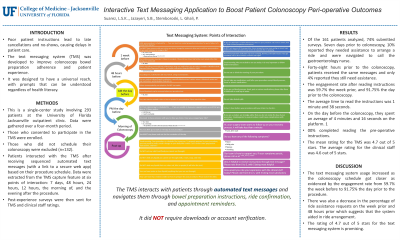Sunday Poster Session
Category: Practice Management
P1195 - Interactive Text Messaging Application to Boost Patient Colonoscopy Peri-Operative Outcomes
Sunday, October 22, 2023
3:30 PM - 7:00 PM PT
Location: Exhibit Hall

Has Audio

Laura Suzanne K. Suarez, MD
University of Florida-Jacksonville
Jacksonville, FL
Presenting Author(s)
Laura Suzanne K.. Suarez, MD1, Seyed Behzad Jazayeri, MD, EMHA2, Lauren Stemboroski, DO1, Maged P. Ghali, MD1
1University of Florida-Jacksonville, Jacksonville, FL; 2University of Florida, Jacksonville College of Medicine, Jacksonville, FL
Introduction: Poor patient instructions lead to late cancellations and no-shows, causing delays in patient care. The text messaging system (TMS) was developed to improve colonoscopy bowel preparation adherence and patient experience. It was designed to have a universal reach, with prompts that can be understood regardless of health literacy. It did not require downloads or account verification. It interacts with patients through automated text messages and navigates them through bowel preparation instructions, ride confirmation, and appointment reminders.
Methods: This is a single-center study involving 293 patients at the University of Florida Jacksonville outpatient clinic. Data were gathered over a four-month period. Those who consented to participate in the TMS were enrolled. Those who did not schedule their colonoscopy were excluded (n=132). Patients interacted with the TMS after receiving sequenced automated text messages (with a link to a secure web app) based on their procedure schedule. Data were extracted from the TMS capture feature at six points of interaction: 7 days, 48 hours, 24 hours, 12 hours, the morning of, and the evening after the procedure. The contents of the TMS are outlined in Image 1. Post-experience surveys were then sent for TMS and clinical staff ratings.
Results: Of the 161 patients analyzed, 74% submitted surveys. Seven days prior to colonoscopy, 10% reported they needed assistance to arrange a ride and were navigated to call the gastroenterology nurse. Forty-eight hours prior to the colonoscopy, patients received the same messages and only 4% reported they still need assistance. The engagement rate after reading instructions was 59.7% the week prior, and 91.75% the day prior to the colonoscopy. The average time to read the instructions was 1 minute and 38 seconds. On the day before the colonoscopy, they spent an average of 4 minutes and 16 seconds on the platform. 100% completed reading the pre-operative instructions. The mean rating for the TMS was 4.7 out of 5 stars. The average rating for the clinical staff was 4.6 out of 5 stars.
Discussion: The text messaging system usage increased as the colonoscopy schedule got closer as evidenced by the engagement rate from 59.7% the week before to 91.75% the day prior to the procedure. There was also a decrease in the percentage of ride assistance requests on the week prior and 48 hours prior which suggests that the system aided in ride arrangement. The rating of 4.7 out of 5 stars for the text messaging system is promising.

Disclosures:
Laura Suzanne K.. Suarez, MD1, Seyed Behzad Jazayeri, MD, EMHA2, Lauren Stemboroski, DO1, Maged P. Ghali, MD1. P1195 - Interactive Text Messaging Application to Boost Patient Colonoscopy Peri-Operative Outcomes, ACG 2023 Annual Scientific Meeting Abstracts. Vancouver, BC, Canada: American College of Gastroenterology.
1University of Florida-Jacksonville, Jacksonville, FL; 2University of Florida, Jacksonville College of Medicine, Jacksonville, FL
Introduction: Poor patient instructions lead to late cancellations and no-shows, causing delays in patient care. The text messaging system (TMS) was developed to improve colonoscopy bowel preparation adherence and patient experience. It was designed to have a universal reach, with prompts that can be understood regardless of health literacy. It did not require downloads or account verification. It interacts with patients through automated text messages and navigates them through bowel preparation instructions, ride confirmation, and appointment reminders.
Methods: This is a single-center study involving 293 patients at the University of Florida Jacksonville outpatient clinic. Data were gathered over a four-month period. Those who consented to participate in the TMS were enrolled. Those who did not schedule their colonoscopy were excluded (n=132). Patients interacted with the TMS after receiving sequenced automated text messages (with a link to a secure web app) based on their procedure schedule. Data were extracted from the TMS capture feature at six points of interaction: 7 days, 48 hours, 24 hours, 12 hours, the morning of, and the evening after the procedure. The contents of the TMS are outlined in Image 1. Post-experience surveys were then sent for TMS and clinical staff ratings.
Results: Of the 161 patients analyzed, 74% submitted surveys. Seven days prior to colonoscopy, 10% reported they needed assistance to arrange a ride and were navigated to call the gastroenterology nurse. Forty-eight hours prior to the colonoscopy, patients received the same messages and only 4% reported they still need assistance. The engagement rate after reading instructions was 59.7% the week prior, and 91.75% the day prior to the colonoscopy. The average time to read the instructions was 1 minute and 38 seconds. On the day before the colonoscopy, they spent an average of 4 minutes and 16 seconds on the platform. 100% completed reading the pre-operative instructions. The mean rating for the TMS was 4.7 out of 5 stars. The average rating for the clinical staff was 4.6 out of 5 stars.
Discussion: The text messaging system usage increased as the colonoscopy schedule got closer as evidenced by the engagement rate from 59.7% the week before to 91.75% the day prior to the procedure. There was also a decrease in the percentage of ride assistance requests on the week prior and 48 hours prior which suggests that the system aided in ride arrangement. The rating of 4.7 out of 5 stars for the text messaging system is promising.

Figure: Interactive Text Messaging System Points of Interaction. Text messaging prompts are sent on 6 separate occasions. The participants are able to actively click on the options of the text message.
Disclosures:
Laura Suzanne Suarez indicated no relevant financial relationships.
Seyed Behzad Jazayeri indicated no relevant financial relationships.
Lauren Stemboroski indicated no relevant financial relationships.
Maged Ghali indicated no relevant financial relationships.
Laura Suzanne K.. Suarez, MD1, Seyed Behzad Jazayeri, MD, EMHA2, Lauren Stemboroski, DO1, Maged P. Ghali, MD1. P1195 - Interactive Text Messaging Application to Boost Patient Colonoscopy Peri-Operative Outcomes, ACG 2023 Annual Scientific Meeting Abstracts. Vancouver, BC, Canada: American College of Gastroenterology.
